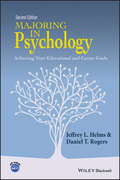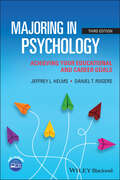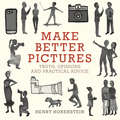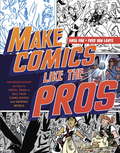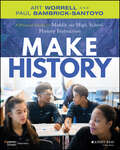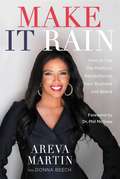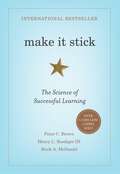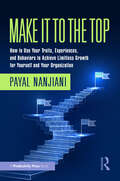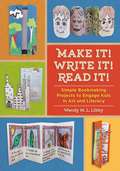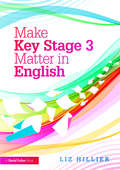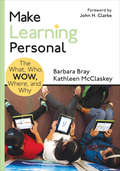- Table View
- List View
Majorcan Catalan in San Pedro, Argentina: The Case for an Endangered Heritage Language Variety
by Marc GandarillasThis book presents empirical and anecdotal evidence on the persistence of the variety of Majorcan Catalan that has been spoken since the 1850s in San Pedro, Argentina. Drawing on a series of 60-minute interviews (N=49) conducted with speakers recruited from the community, this study demonstrates how most participants appear to have preserved their heritage language to some extent, according to their observed Performative Language Competency levels (PLCs). Building on participants' firsthand accounts, additional historical, anthropological, and sociolinguistic details are provided to convey a vivid picture of the community, its traditions, speakers' attitudes to their heritage language, and the current status of San Pedro Majorcan Catalan in terms of endangerment. Within the field of understudied minority languages in the Americas, the reader of this volume will find an innovative, distinct approach to bilingualism in ‘heritage vs. majority language’ settings, which will beof interest to scholars and students with a background in sociolinguistics, bi- and multilingualism, and language policy and revitalization.
Majoring in Psychology: Achieving Your Educational and Career Goals
by Jeffrey L. Helms Daniel T. RogersUpdated to reflect the latest data in the field, the second edition of Majoring in Psychology: Achieving Your Educational and Career Goals remains the most comprehensive and accessible text for psychology majors available today. The new edition incorporates the most up-to-date research, as well as recent changes to the GRE Reveals the benefits of pursuing a psychology degree and shows students how to prepare for a career or to continue with graduate study in the field Features a wide range of supplemental exercises and materials plus topical contributions written by national and international figures in their respective psychology subfields Online support materials for instructors include Powerpoint slides and test banks to support each chapter
Majoring in Psychology: Achieving Your Educational and Career Goals
by Jeffrey L. Helms Daniel T. RogersMAJORING IN PSYCHOLOGY The gold standard in preparing for an undergraduate education and career in psychology. In the newly revised Third Edition of Majoring in Psychology: Achieving Your Educational and Career Goals, distinguished psychologists and educators Drs. Jeffrey L. Helms and Daniel T. Rogers deliver an accessible and concise review of ideal strategies for embarking on a successful undergraduate career in psychology. Readers will discover the benefits of pursuing a psychology degree and learn how to prepare for a career in the field or to continue with graduate study. Filled with brand-new content, this edition includes updated statistics and links; increased considerations of issues of diversity, inclusion, and representation; new professional spotlights and insider’s perspectives; and an expansion of the information on careers in research. The book also offers a wide range of supplemental exercises and materials. The new edition includes access to significantly revised instructor’s materials, including accessible PowerPoint slides and an updated test bank for each chapter, as well as: A thorough introduction to succeeding in college, including important transitions to make, strategies to apply, and resources to access Comprehensive explorations of assessing and developing career goals and how to use a bachelor’s degree in psychology to prepare for the job market or graduate school Practical discussions of careers in the various subfields of psychology, from forensic psychology to academia An in-depth assessment of the modern career outlook for psychology majors Perfect for aspiring and current undergraduate students considering or undertaking an undergraduate course of study in psychology, Majoring in Psychology is an indispensable resource for anyone contemplating a career in clinical, counseling, forensic, or any other subfield of psychology.
Majority Decisions
by Jon Elster Stéphanie NovakThis book presents the most complete set of analytical, normative, and historical discussions of majority decision making to date. One chapter critically addresses the social-choice approach to majority decisions, whereas another presents an alternative to that approach. Extensive case studies discuss majority voting in the choice of religion in early modern Switzerland, majority voting in nested assemblies such as the French Estates-General and the Federal Convention, majority voting in federally organized countries, qualified majority voting in the European Union Council of Ministers, and majority voting on juries. Other chapters address the relation between majority decisions and cognitive diversity, the causal origin of majority decisions, and the pathologies of majority decision making. Two chapters, finally, discuss the counter-majoritarian role of courts that exercise judicial review. The editorial Introduction surveys conceptual, causal, and normative issues that arise in the theory and practice of majority decisions.
Maju, ¡Mirá el relajo que armaste!
by Cecilia Curbelo¡Animate a descubrir esta nueva historia junto con Maju! Maju tiene ocho años. Vive con sus padres y con Zulma, su abuela. Es graciosa, charlatana, divertida y justiciera. Dos por tres mete la pata, pero siempre por algo que le parece que vale la pena. Su sueño es ser árbitra de fútbol, y para eso practica en los recreos de la escuela. En esta nueva aventura, Maju y sus amigos llegan para enseñarnos la importancia de los vínculos que construimos con entusiasmo, amor y dedicación. A veces esos vínculos son incluso más importantes que los propios parentescos, porque los elegimos y los cuidamos todos los días.
Maju, ¡Mirá el relajo que armaste!
by Cecilia Curbelo¡Animate a descubrir esta nueva historia junto con Maju! Maju tiene ocho años. Vive con sus padres y con Zulma, su abuela. Es graciosa, charlatana, divertida y justiciera. Dos por tres mete la pata, pero siempre por algo que le parece que vale la pena. Su sueño es ser árbitra de fútbol, y para eso practica en los recreos de la escuela. En esta nueva aventura, Maju y sus amigos llegan para enseñarnos la importancia de los vínculos que construimos con entusiasmo, amor y dedicación. A veces esos vínculos son incluso más importantes que los propios parentescos, porque los elegimos y los cuidamos todos los días.
Maju, ¡no sos el ombligo del mundo!
by Cecilia CurbeloMaju es justiciera, buena compañera y excelente amiga, pero a veces sus papás le tienen que recordar que todas las personas somos distintas y que ella ¡no es el ombligo del mundo! Maju tiene ocho años. Es fanática de los helados, el maní y los caramelos masticables, pero lo que más le encanta (además de hablar) es ser árbitra de fútbol. Le aburre mucho aprender las tablas de multiplicar, pero eso cambia cuando conoce el método que usa su amigo Gerónimo: ¡el rap de las tablas! Por eso, el día que la maestra anuncia la prueba final de matemáticas, Maju está segura de que le va a ir requetebién. Sin embargo, las cosas no salen como las imaginó.
Maju, ¡pará de hablar!
by Cecilia CurbeloMaju es una niña divertida, charlatana y llena de historias que quiere compartir con vos. Maju tiene ocho años y vive con sus papás, su abuela Zulma (a la que le encanta el reguetón) y sus cuatro hámsteres. Maju es charlatana, igual que su abuela y su amiga Julia, con quien comparte la clase junto con otros compañeros. En esa escuela viven muchas experiencias, de las lindas y de las otras. Maju no para de hablar, no puede, es más fuerte que ella, pero eso hace que sea muy divertida y graciosa. Conocé esta historia llena de humor y travesuras.
Make Art Where You Are Guidebook
by Courtney CerrutiExplore mindfulness and self-expression with this guide to sketching your surroundings on long weekends, vacations, or wherever you happen to be. In this guidebook, artist Courtney Cerruti provides her tool kit for capturing the essence of a place and your personal impression of everything you see. From a five-minute blind contour of a cup of coffee to an hour-long sketch of a cityscape, the guidebook is filled with ideas for finding opportunities to draw, make marks, and paint while you are on the move. Each activity includes the estimated time needed to finish, a unique feature that helps you find a moment for art-making in your travel itinerary or your daily life. Whether you are an experienced artist looking for a new perspective or an aspiring creative who needs some guidance, Make Art Where You Are empowers you to enjoy the mindful practice of observing and recording your experiences.
Make Better Pictures: Truth, Opinions, and Practical Advice
by Henry HorensteinHenry Horenstein may be the world's bestselling photography teacher, with more than 700,000 copies of his photography manuals sold. Now, in this easily digestible book of wisdom, he distills a career's worth of instruction into one hundred memorable pieces of advice. Photography has never been a bigger part of our lives. But how do you transform everyday snapshots into enduring images -- or merely upgrade your Instagram game? With images illustrating the impact of each tip, and with examples drawn from iconic artists, Horenstein shows casual and expert photographers alike how to take the best photographs on every device--from a DSLR to an iPhone.
Make Comics Like the Pros
by Fred Van Lente Greg PakA step-by-step guide to all aspects of comic book creation--from conceptualization to early drafts to marketing and promotion--written by two of the industry's most seasoned and successful pros. Discover the Secrets of Your Favorite Comic Book CreatorsDo you want to break into the comics industry? There are many creative roles available--writer, penciller, inker, colorist, letterer, editor, and more. Each creator serves a vital function in the production of sequential art at companies such as DC, Marvel, Image, and Valiant. In Make Comics Like the Pros, veteran comics creators Greg Pak and Fred Van Lente team up with a who's who of the modern comic book scene to lead you step-by-step through the development of a comic. With these two fan-favorite writers as your guides, you'll learn everything from script formatting to the importance of artistic collaboration to the best strategies for promoting and selling your own sequential art masterpiece. Pak and Van Lente even put their lessons into practice inside the pages of the book--pairing with Eisner Award-winning cartoonist Colleen Coover (Bandette) to produce the swashbuckling, adventure comic Swordmaids, and giving you front row seats to their creative process. Make Comics Like the Pros provides all the answers you've been seeking to take your comic book-making dreams all the way to professional-level reality.From the Trade Paperback edition.
Make Early Learning Standards Come Alive
by Gaye GronlundEvery state has developed some form of early learning standards. Find out how you can apply and use them in ways that are most beneficial to children.Updated to reflect the continuing evolution of early learning standards, this book offers help and hints, support and clarification, and clear explanations of how you can make early learning standards come alive in your early childhood classroom or program. You'll find tools to communicate exactly how you are addressing children's learning as you plan for cognitive and foundational skill development, as well as suggestions to assess children's progress. Easy-to-read charts present information about each major content area or area of development and descriptions of what those standards might look like in classrooms. The charts also suggest activities and interactions to support a child as he or she makes the first attempts toward the standard, progresses toward it, and finally accomplishes the standard.New to this edition: A chapter focusing on Approaches to Learning standards The most recent information on early learning standards from across the country References to the Common Core State Standards and their relationship to early learning standardsGaye Gronlund has consulted for national organizations, state agencies, school districts, and early childhood programs for more than twenty years. She helped two states write their early learning standards. Gronlund is well known for her many books and keynote presentations.
Make Fun!: Create Your Own Toys, Games, and Amusements
by Bob KnetzgerYou don't need to own a factory to make toys. Author and toymaker Bob Knetzger has been making fun stuff all his life with simple technology like vacuum forming and mold-making. In an age where makers are tantalized by the capabilities of 3d printers and other digital fab technology, this book takes you back to old-school hand tools, simple electronics, and working with metal and plastic to make toys every bit as good as those you can find in a big-box store. This book has something for everyone, from a marble maze to a talking booby trap; from custom cookie cutters to an "EZ Make" oven. Discover the basic principles of science, electronics, and engineering through hands-on projects that range from easy to more challenging... and are always fun!
Make Great Art on Your iPad: Draw, Paint & Share
by Alison JardineFully revised to reflect the latest updates in the most popular creativity apps, this is the original, best-selling guide to using creative apps on your Apple device to produce your very own masterpieces. Artists like David Hockney have taken to creating art on the iPad, but you don't have to be an artist to achieve great results on your device. This refreshingly accessible book is perfect for skilled artists and creative wannabes alike. Alongside the step-by-step projects that teach the fundamentals of digital painting, there are also some easy and fun artistic tricks that anyone can try. You'll master the most popular art apps, and you will learn new painting and drawing skills along the way.Includes advice on using Procreate, ArtRage, Art Studio for iPad, Adobe Photoshop Sketch, Pen & Ink, Brushes and Tayasui Sketches Pro.
Make Great Art on Your iPad: Draw, Paint & Share
by Alison JardineFully revised to reflect the latest updates in the most popular creativity apps, this is the original, best-selling guide to using creative apps on your Apple device to produce your very own masterpieces. Artists like David Hockney have taken to creating art on the iPad, but you don't have to be an artist to achieve great results on your device. This refreshingly accessible book is perfect for skilled artists and creative wannabes alike. Alongside the step-by-step projects that teach the fundamentals of digital painting, there are also some easy and fun artistic tricks that anyone can try. You'll master the most popular art apps, and you will learn new painting and drawing skills along the way.Includes advice on using Procreate, ArtRage, Art Studio for iPad, Adobe Photoshop Sketch, Pen & Ink, Brushes and Tayasui Sketches Pro.
Make History: A Practical Guide for Middle and High School History Instruction (Grades 5-12)
by Paul Bambrick-Santoyo Art WorrellMake History with Your Students From bestselling author Paul Bambrick-Santoyo and Art Worrell, Uncommon Schools’ Director of History Instruction, comes Make History, an inspiring book on how educators can take history instruction to the next level. History teachers face unique challenges in introducing history lessons to students, and they are under increasing pressure to get it “right” in an age of social progress and social divisiveness. This book is a guide to bring the past to life while teaching students how to make sense of history. Use the ideas and techniques to turn your history students into writers, readers, and thinkers who are ready not only to succeed in college, but also to become leaders and change agents. By showing how to teach rigorous, engaging lessons that center student thinking and voice, Make History turns history class into the most exciting part of a student’s day. Reimagine history education to help students build their own unique arguments about the past Ask tough questions to help students grapple with difficult historical periods Set the stage for authentic discourse that students remember long past the bell Give students the tools to become socially aware, build their own identity, and think and write like historiansTeachers and instructional coaches in grades 5-12 will love this new, insightful approach to history—one that works for today’s classrooms.
Make It Rain!: How To Use The Media To Revolutionize Your Business & Brand
by Areva Martin Donna Beech Phil McGrawWhat if you could get in front of millions of prospects with the avid endorsement of famous influencers--without spending a dime?It's happening right in front of you every day. Guest experts on TV, radio, podcasts, blogs, and live streaming are getting local and national exposure for their business and brand that they could never have afforded to reach with ads.For a decade, Areva Martin has used the media to build a huge platform that expanded the influence and power of her brand exponentially. Media appearances on Dr. Phil, Anderson Cooper 360, The Doctors, CNN, MSNBC, FOX, and more have virtually eliminated the need of a marketing budget for her thriving law firm and non-profit organization, while securing her place as one of America's most sought after thought leaders.In Make It Rain! Areva breaks the silence to reveal what insiders know about the power of media appearances to revolutionize a business and brand and get your core message out to the people who need it most. You'll learn how to: Match your brand to the right audience and media venues Craft pitches producers can't resist Jump on breaking news shows Pivot and speak in soundbites like the pros Amplify every interview with social media Turn appearances into platform and become a rainmakerNever before have there been more ways to build a presence that matters. Whether you are the executive of a corporation, the author of an upcoming book, the owner of a rapidly growing small business, or the public face of a local nonprofit or association, if you have a business to build or people you want to help, nothing beats using the media to create the visibility, influence, and power you need. Are you ready to Make It Rain!?
Make It Stick: The Science of Successful Learning
by Peter C. Brown Mark A. McDaniel Henry L. Roediger IIIThe international bestseller that has helped millions of students, teachers, and lifelong learners use proven approaches to learn better and remember longer.“We have made Make It Stick a touchstone for our instructors … to gain a real advantage for our learners as they tackle some of the toughest work in the world.” —Carl Czech, former Senior Instructional Systems Specialist/Advisor, US Navy SEALsAre you tired of forgetting what you learn? This groundbreaking book, based on the latest research in cognitive science, offers powerful strategies to boost memory and learning.To most of us, learning something “the hard way” means wasted time and effort. Good teaching, many believe, should be tailored to the different learning styles of students and should use strategies that make learning easier. Make It Stick turns fashionable ideas like these on their head. Drawing on recent discoveries in cognitive psychology and a ten-year collaboration among some of the world’s leading experts on human learning and memory, the authors explain what really drives successful learning. With clear, real-world examples, they show how we can confidently hone our skills and learn more effectively.Many common study habits simply don’t work. Underlining, highlighting, rereading, cramming, and single-minded repetition of new skills create the illusion of mastery, but gains fade quickly. Science shows that more durable learning comes from self-testing, introducing certain difficulties in practice, waiting to re-study new material until a little forgetting has occurred, and interleaving the practice of one skill or topic with another. Make It Stick breaks down these proven approaches in compelling ways and offers concrete techniques for becoming more productive learners.Full of eye-opening and inspiring stories for students, educators, and parents, Make It Stick is an indispensable guide for all those interested in the challenge of lifelong learning and self-improvement.
Make It To the Top: How to Use Your Traits, Experiences, and Behaviors to Achieve Limitless Growth for Yourself and Your Organization
by Payal NanjianiYou are working hard. You are sustaining your job. You are doing well in your field. Life seems fine. But there is something that’s holding you back from making it to the top in your field of work. That something could be an annoying habit, a behaviour, or a trait that’s getting you stuck in your career. All of us want promotions and salary increases. We desire to make it to the top. But most of us don't realize that these things cannot be asked for by putting our hands out.You can get that promotion, the salary raise, the new project, the visibility, the sponsors, the accolades, and the achievements only when you work on yourself harder than you work on your job. You must become such that success, promotion, and job offers begin to follow you everywhere.In this book, Payal Nanjiani points out that the reason why many do not make it to the top is not because of a lack of information, abilities or skills. Having private access to some of the world's most successful industry leaders, she tells you that those who truly make it to the top in their careers are doing things differently than others. An expert coach, who helps leaders globally overcome their unconscious habits and behaviours to attain higher levels of success, she has worked with corporates and leaders around the globe bringing about a huge transformation in the thinking and behaviours of leaders. Her one-on-one coaching comes with a six-figure price tag. But in this book, Payal shares some great advice and strategic solutions to reach the top without a hefty price tag. The book has hands-on advice on what to do, how to do it, and what transformation to bring about in your thinking and habits. These ideas, powers, and habits have been tested in practice on numerous executives Payal has coached in the past eighteen years and are helpful to people in every part of the organization.We all face challenges and deal with setbacks. But in the long run, you'll achieve incredible growth and success if you're willing to change your thinking and behaviours.Are you ready to unlock your leadership powers and live your best life?
Make It! Write It! Read It!: Simple Bookmaking Projects to Engage Kids in Art and Literacy
by Wendy LibbyCrafting projects that provide literacy and curriculum ideas to enrich the classroom Make It! Write It! Read It! develops art and literacy skills through the craft of bookmaking, inspiring elementary-aged children to read, write, and tell stories with their creations. Creative, fun, field-tested projects include 17 different blank book designs such as accordion fold, coffee filter, hanging tassel, and paper bag books. These designs are then applied to 23 specific book projects kids are sure to love, with suggestions for making literary connections--writing poems, paragraphs, or simple stories related to their creations. Kids will delight in making books that include three-part fish, a creature pop-up, a double-sided mountain, and an ocean scene, among many others. Carefully crafted with teachers and parents or caregivers of kids aged 4-10 in mind, each activity has educational objectives for the project; skills developed; materials needed; clear, illustrated, step-by-step instructions; and literary connection ideas. The text is specific enough for beginners who need more direction yet offers open-ended possibilities for imagination and creation for more experienced bookmakers, writers, and artists.
Make Just One Change: Teach Students to Ask Their Own Questions
by Luz Santana Wendy D. Puriefoy Dan RothsteinThe authors of Make Just One Change argue that formulating one's own questions is "the single most essential skill for learning"--and one that should be taught to all students. They also argue that it should be taught in the simplest way possible. Drawing on twenty years of experience, the authors present the Question Formulation Technique, a concise and powerful protocol that enables learners to produce their own questions, improve their questions, and strategize how to use them.Make Just One Change features the voices and experiences of teachers in classrooms across the country to illustrate the use of the Question Formulation Technique across grade levels and subject areas and with different kinds of learners.
Make Just One Change: Teach Students to Ask Their Own Questions
by Luz Santana Dan RothsteinThe authors of Make Just One Change argue that formulating one&’s own questions is &“the single most essential skill for learning&”—and one that should be taught to all students. They also argue that it should be taught in the simplest way possible. Drawing on twenty years of experience, the authors present the Question Formulation Technique, a concise and powerful protocol that enables learners to produce their own questions, improve their questions, and strategize how to use them.Make Just One Change features the voices and experiences of teachers in classrooms across the country to illustrate the use of the Question Formulation Technique across grade levels and subject areas and with different kinds of learners.
Make Key Stage 3 Matter in English
by Liz HillierThe KS3 curriculum plays a critical part in giving students the best possible start to their secondary education and preventing the need for intervention later on. This timely book provides detailed guidance on how to develop a robust, multifaceted, inclusive and challenging KS3 curriculum in English that provides a secure and progressive link between KS2 and KS4. Featuring examples of curriculum models and audits of current practice, chapters cover key topics such as: developing the planning cycle; transitioning between primary and secondary English; assessment in KS3 English; creating a model that supports and challenges students of all levels; LAC and SPAG: divisive or cohesive abbreviations; speaking and listening in the KS3 English curriculum; using multimodal texts; examples of how meaningful homework can successfully embed itself in a KS3 English curriculum model. Make Key Stage 3 Matter in English will be an invaluable resource for KS3 English coordinators, teachers and all those involved in the planning and delivery of the KS3 English curriculum.
Make Learning Personal: The What, Who, WOW, Where, and Why
by Ms Barbara A. Bray Ms Kathleen A. McClaskeyPut learning back into the hands of the learner! Personalized learning empowers learners to take control of their own learning. This resource draws on Universal Design for Learning® principles to create a powerful shift in classroom dynamics by developing self-directed, self-motivated learners. You’ll discover: A system that reduces barriers and maximizes learning for all learners An explanation distinguishing personalization from differentiation and individualization The Stages of Personalized Learning Environments that transform teacher and learner roles. Background information to build a rationale on why to personalize learning Strategies around the culture shift in classrooms and schools as you personalize learning. As recognized authorities, the authors have led educational innovation for almost three decades.
Make Like a Tree and Leave
by Paula DanzigerSixth grader Matthew Martin gets a little too "wrapped up" in his Egypt Unit Project in this reissue of a popular Paula Danziger story.

